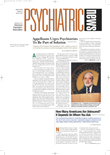Language is what separates us from goats and various other creatures. How we use our language speaks volumes about who we are, what we think, and even about our values, such as honesty and integrity.
The other day I was reviewing an evaluation from my nurse practitioners. There were 10 actions or behaviors listed; the 10th was, “Demonstrates a customer-focused practice.” That pushed me over the edge: I had for years been putting up with the word “client” in reference to patients whom I treat. (I have actually insisted for quite some time that if they see me, they are “patients.”)
I looked up the definition of many of these words and also polled a number of my non-M.D. colleagues (we are called “providers”—probably some bureaucratic convenience), asking them when they thought we moved from “patient” to “client” and what they considered the reason for that change.
The timing was placed variously in the 1960s or 1970s. One Ph.D. opined that it was an attempt to “empower” the patient by moving away from connotations of sickness or illness. Actually, the word client is “one leaning on another person (for protection).” This does not sound terribly empowering.
Another colleague surmised that health care professionals working in agencies without a medical presence tended to reject the medical model (in favor of a social model?). Another thought that the impetus for using “client” was an attempt to avoid diagnosing and thus pigeon-holing the person and to “depathologize” mental illness. By the way, the word “patient” means “a person receiving care or treatment.”
The probable origin of this movement began with the 1951 publication of Client-Centered Therapy by Carl R. Rogers, Ph.D. He chose to use the word “client” “because, in spite of its imperfections of dictionary meaning and derivation, it seems to come closest to conveying the picture of this person as we see it” (italics mine). Thus, he summarily dismisses Noah Webster and his followers and decides to shape the word to his specifications. He defines a client as “. . .one who comes actively and voluntarily to gain help on a problem, but without any notion of surrendering his own responsibility for the situation” (italics mine).
So, Rogers ascribes a certain motivation to the “client” before he even sees the person. I believe this is called an unwarranted and unsupported assumption. Finally, he notes that to label someone a “client” “avoids the connotation that he is sick,” and goodness knows we don’t want to be caught treating people who are sick.
This may seem a trivial concern to some; however, playing fast and loose with the language can ultimately lead to dire consequences. If our language usage deteriorates, our culture may follow. Arbitrarily bending the meanings of commonly accepted words and concepts to meet one’s own needs should be frowned upon.
Unfortunately, common and persistent usage may prevail in this case. I hope not.
